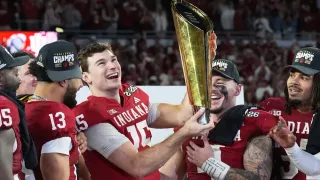October 22, 2016
Inclusive Tribe Adds Hotel to Casino
Lois Pearlman READ TIME: 3 MIN.
When Graton Rancheria Tribal Chairman Greg Sarris showed up at Guerneville's Rainbow Cattle Company this summer with a $10,000 check for the Orlando massacre survivors, it was obvious that the Graton folks are not just your every day casino owners.
"This was never seen as an end itself," Sarris said, referring to the tribe's 254-acre casino in Rohnert Park, Sonoma County. "It is a way to support social justice and environmental restoration."
The occasion for his comment was a recent hard-hat media tour of the casino's new 200-room hotel, scheduled to open November 15.
In addition to the Orlando donation, the tribe has provided profits from its casino for a variety of other causes. These include restoration of Tolay Regional Park, a traditional Indian healing site just south of Petaluma. The tribe also gave $200,000 to support a regional park tax measure and $30,000 for a Sonoma County genetically modified organism, or GMO, ban campaign.
And, said Sarris, who said he is "openly gay and proud of it," another priority for the tribe is making everybody feel welcome.
"The only thing not tolerated here is intolerance," said Sarris, who asked that his age not be published. "I love seeing gay, lesbian, and transgender people walking in here, and holding hands in the bars and restaurants."
And there are plenty of opportunities for LGBT people to be open and out at the casino. They include regular gay Bingo Sundays, which raise funds for the county's annual gay Pride event, drag shows in the entertainment venue, as well as other gay-friendly performers - even a Tupperware party.
The Federated Indians of the Graton Rancheria, owners of the casino complex, is a polyglot tribe, made up of Coast Miwok and southern Pomo people, whose traditional lands included parts of Marin and Sonoma counties, as far north as Sebastopol.
In the early 1900s the federal government granted a 15-acre reservation to the remnants of these tribes, survivors of the encounter between Indians and European/American settlers. Fifty years later the government revoked the Graton Rancheria's federal recognition and sold off most of the land.
Then, in 1992, under Sarris' leadership, the tribe began the slow process of re-enlisting the descendants of the Graton people. They regained recognition in 2000 with the signing of the Graton Rancheria Restoration Act. This entitled the tribe's 1,300 members to purchase trust land, where they built the casino in 2014.
The casino, with its inlaid floor sparkles, undulating lines, and natural wood and stone exterior, looks like a cross between Busby Berkeley and Frank Lloyd Wright. Entering through the casino's front doors one almost expects to see a chorus line come waltzing through the gaming tables.
On the other hand, the new hotel and convention center definitely leans toward the natural end of the spectrum, opulent but warm, with lots of brown tones, natural materials, and huge murals of rural Sonoma County. The standard-size rooms are already completed, decorated in angular shapes of black, orange, and white. There are also 16 suites, which feature living/dining spaces, entertainment centers, wet bars - and in the largest rooms - butler's quarters.
Sarris said that the hotel will make the casino a complete destination spot, and help pay down the tribe's debt. The casino and entertainment center cost $800 million, and the hotel/convention center an additional $175 million. The whole operation was developed, and is managed, by the Las Vegas-based Stations Casinos.
For his leadership role in this enormous undertaking, the Golden Gate Business Association, a Bay Area LGBT chamber of commerce, will be honoring Sarris at its Power Lunch January 31.
"It's an annual event where we honor extraordinary businesspeople," said GGBA President Paul Pendergast.
When Sarris is not busy with tribal affairs, he is a professor of creative writing and Native American studies at Sonoma State University. He is also the author of a novel, "Watermelon Nights," and a collection of short stories, "Grand Avenue," both of which are semi-autobiographical, and several nonfiction books. Several years ago "Grand Avenue" was adapted as an HBO miniseries.
For more information, visit https://www.gratonresortcasino.com






